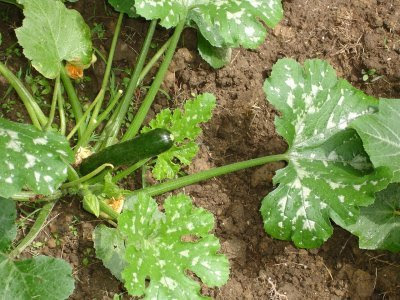 Why is it that I have not been able to grow cucumbers this year? We have planted twice this year, early (in June) and late (in late July.) Both times we planted a couple hundred feet in each of our two fields. They all died.
Why is it that I have not been able to grow cucumbers this year? We have planted twice this year, early (in June) and late (in late July.) Both times we planted a couple hundred feet in each of our two fields. They all died.Out of the June plants we got a handful of fruit, maybe 80 total, before the plants succumbed. We did our best to keep them alive, we sprayed them with organic fungicide a couple times (options for these products are limited and expensive) but without success.
I fear the culprit is downy mildew, to which cucumbers are particularly susceptible and which thrive in cooler wet weather, like the weather we had this spring and early summer. Unfortunately, conventional wisdom says once you see the outbreak it is to late. The cure is spraying fungicides on your crops regularly, before an outbreak. But one of the hallmarks of natural production is that you do not treat a problem that does not exist. Scout and treat. Don't use fungicides and pesticides you don't need!
As our CSA members know this has not been a year for either squash or cucumbers. Most of our summer squash was also infected, which has limited our harvest to very small amounts of all but one very hearty heirloom zucchini (which our CSA members know well by now!) And unfortunately, our winter squash is also not doing well and the melons all had to be tilled under (no fruits at all!)
The Ohio State extension confirms that this disease which will not overwinter in our climate and was once considered only a late summer problem in Ohio, when some of the spores made their way up this far born on winds from hurricanes was spotted in Ohio (Medina, Erie, Summit, and other northern counties) as early as June this year. The theory, I gather, is that it is overwintering in Canadian greenhouses, which is why it is seen so much in Northern Ohio and not as much in southern Ohio.
So what can we do? First, we can take a little solace in the knowledge that it cannot overwinter, so future contamination will be from the wind and not our soil, even in areas which have been previously infected. Secondly, next year we will have to start a preventive spraying program on all our cucumbers, melons, winter squash, summer squash, and pumpkins. This will be expensive (as organic options for fungal control are limited.) It also goes a little against what we try to do, however we have had severe losses this year and while risk is part of being a CSA member, it's our responsibility as CSA farmers to do whatever in our power to reduce that risk.
So a sprayer for the tractor is defiantly on the list of purchases for next year.
3 comments:
Every year since I started gardening (this is year #3) this mildew shows up and kills all my melons, pumpkins and squash. This year I tried mulching with straw, hoping the straw would somehow magically help.
No dice. Really makes me sad.
Next year we are going to try prevenative sprayings of Baking Soda and Food Grade Hydrogen Peroxide... We're keeping our fingers crossed!
I read here about using milk to stop it.
Best of luck to you.
Post a Comment